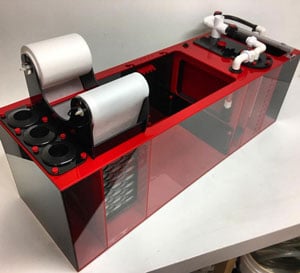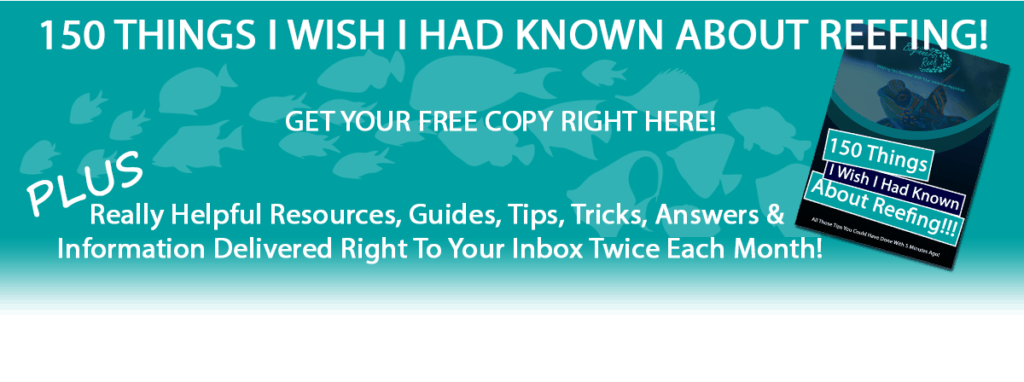My wife loves candles and those scented oil heaters and it drives me nuts! I swear we have more candles and oils than socks! But, I had to try and provide her with information to prove they were harming our aquarium. Now she only has them in the kitchen, which was our compromise.
Some of them really made me gag because they were so strong so I knew they were doing harm to my aquarium. Every time she would burn/spray one in the living room, my protein skimmer would go nuts!
Most candles, scented oils, and air fresheners are aquarium safe but any chemical that is made to disperse into the air could cause a problem for your aquarium. Care is needed when using these products near an aquarium and running activated carbon in the filter is always recommended.
Are Burning Candles Toxic To Aquariums?
Over the years, the ingredients that go into making candles have varied greatly. The general consensus is that burning candles in the same room as the aquarium is generally safe. However, there have been cases where burning some scented candles have caused the death of aquatic livestock.
The main things to be aware of with candles are these:
- If the candle puts off a very strong scent, to the point it makes your throat sore, then it could have an effect.
- If the candle puts off a lot of dark, acrid smoke then that could cause you issues.
- Some candles used to have a wick that contained a lead wire. The lead could become an issue.
Most candles are based on Parafin wax which when burned can release toxins and carcinogens into the air.
In most cases, burning candles in the same room are not a problem for aquariums.
If you stay with the Unscented, Soy-Wax, or Bees-Wax type candles you should never have a problem.
The scented candles are hit or miss on whether they could have an effect on your aquarium. If you are unsure, refrain from lighting one of these types of candle in the same room.
I have reached out to Yankee Candle and Bath & Body Works for confirmation that their products are non-toxic to aquatic life and as you can imagine, their customer service departments ensured me that they are safe. Of course they are! They will never admit their products are potentially harmful!
Are Air Fresheners Toxic To Aquariums?
Are fresheners pose a bit more of a problem as they are mainly chemical based and they are designed to spray the chemicals a good distance into the air.
The other problem with air fresheners is that they are also designed to stay airborne for as long as possible to help disperse their smell, which gives the pollutants more time to enter the water of the aquarium.
The majority of air fresheners on the market are made to create a smell or aroma to help hide, remove or absorb foul odors. The range of chemicals used in a typical spray like Febreeze or similar is huge.
Just have a look at the ingredients list on the side of the bottle! Even the ‘Green/Eco-Friendly’ bottles have some nasty chemicals that are toxic to aquatic life.
Any one of the chemical substances used in many of the air fresheners is enough to send your protein skimmer nuts, let alone poison your livestock if enough of them are absorbed into the water column.
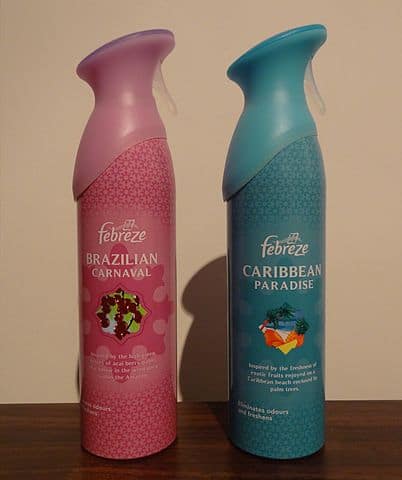
The use of sprayed products within your home should be minimized as much as possible once you are a saltwater aquarium owner.
The rule is, ‘If you can smell it, then it’s in your water!’
Are Scented Oils Toxic To Aquariums?
Scented and Essential oils have boomed in the last decade and so have the mechanisms which dispense them. Oil warmers, Oil diffusers, Scented Sprayers are just a few. It seems many homes now have these in them to give constant fragrance but do they pose a problem to the aquarium owner?
The general results I have found from my own wife and the research I have done is very similar to candles. Dozens and dozens of aquarium owners have spouses who love these oils and they have ran them for years with no effect on their aquariums.
My wife sells Scentsy and has both the oil defusers and wax warmers all through our house (I think she has a bigger addiction to those than I do with reefing haha) I haven’t had any problems with any of my tanks. As said before, the only ones you need to worry about are the ones that spray the scent into the air.
DustyXB9Reefer – Reef2Reef.com
The sprayed oil devices seem to be given a wide berth with many of the aquarium owners. Just like Air Fresheners, the oils are designed to be dispersed far and hang in the air for as long as possible. Once again, this gives the oil more chance to enter the water as a large droplet of toxin (Large on a molecule scale).
Some essential oils may contain the following ingredients which are known to cause health problems to pets in general as well as aquatic life:
- Phenols – Oils derived from Anise, Clove, Thyme & Oregano, etc
- Monoterpene Hydrocarbons – Oils Derived from Pine, Juniper Berry, Dill, etc
- Phenylpropanes – Oils Derived from Basil & Cinnamon etc
- Ketones – Oils derived from Pennyroyal, Wormwood & Lavender, etc
As with the candles, there are hundreds of oil manufacturers and as many scents and oil recipes. Like with all the potential pollutants above, a small test is needed if you want to be sure.
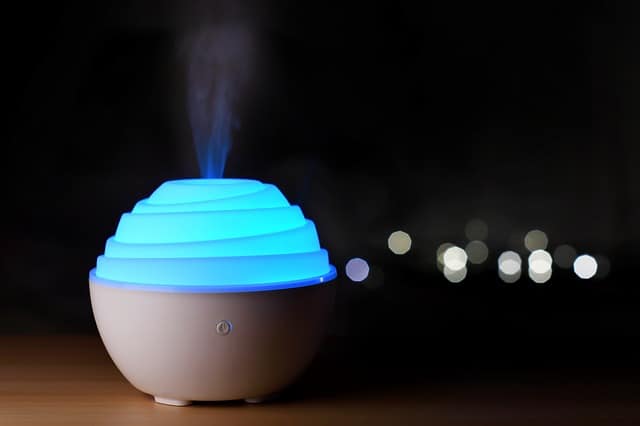
Most owners limit the use of the oils to other rooms in the house until they are 100% happy they pose no threat to their aquarium.
Other Pollutants To Be Aware Of:
The ingredients contained within candles, oils & air fresheners are not the only items that could cause harm to your aquatic family members. They should instigate you to look around your home to diagnose potential toxic sources before they make it into the water.
Here are a few more you may need to think about using:
Painting with a strong odor, oil-based paints
Wifes or daughters nail painting party
Cleaning windows with aerosol Windex
Furniture polish sprays
Oven cleaner sprays
All of the above have been the cause of an entire aquarium crash because the owner had no idea of the effect!
Some other tips are…
Any chemical made to disperse into the air.
Substances with very strong odors.
Dirty hands and arms when working in the aquarium – Did you have any soap or perfume or any other toxic chemicals on your hands when you interacted with the tank? You could accidentally leach some chemicals into your tank.
Using Clean, Aquarium-Only towels for hand wiping when working in the tank.
How Do Pollutants Affect An Aquarium?
There are three main ways that airborne pollutants can affect the chemical balance within your aquarium, which can lead to loss of life.
- Oxygen
Your aquarium exchanges gases through the water surface. As the surface is agitated by your wavemakers and return pump it allows oxygen to be absorbed and gases like nitrogen and carbon dioxide to be expelled.
This water area is the first place that an airborne pollutant will come into contact with your water. Some pollutants can create an oily film on the surface of the water which can prevent this gas exchange.
Other pollutants can strip the oxygen out of the water through a chemical reaction. Your livestock is most susceptible to oxygen reduction and it is usually the first thing that will kill. - Rapid Ph Swings
Many people like to use candles, oils or air fresheners in the evenings after cooking meals or relaxing. Over the hours of darkness is when your aquarium will have its greatest Ph swing and now you could have added to a larger swing.
When the lights go out in your aquarium the algae and coral stop photosynthesizing (consuming carbon dioxide and releasing oxygen), but your fish and invertebrates continue to consume oxygen.
Over the night the amount of oxygen consumed and the amount of carbon dioxide released increases which cause the Ph of the water to drop.
If the absorbed pollutant also helps to consume, convert or reduce the oxygen, the Ph swing could be rapid and you wake up to a dead aquarium. - Toxic Compounds
The last way to affect your livestock is by the concentration of a chemical being so high that it begins to harm the cells within an animal. Some essential oils, for example, can affect the liver and cause sudden death due to liver failure over a prolonged exposure period.
Just like humans, the array of substances that are toxic to tissue is vast and with the fish and invertebrates being in an enclosed environment, if a pollutant is not removed quickly it can do irreversible damage.
Corals, especially SPS are very susceptible to chemical imbalances and require the most pristine water quality to thrive. Before you begin to keep corals I suggest you look at your household cleaning routines to see which sprays and aerosols you can swap for cream cleaners etc.
How Do You Diagnose If Your Aquarium Has Been Poisoned?
- Investigate
Have you awoke to or come home to a cloudy aquarium? Are fish dead? Are fish gasping at the surface? Are there fish lying on the sandbed? Is it just one animal affected or multiple? Is there an oily residue on the water surface? Does the aquarium water stink? - Evaluate
If you are dealing with one dead fish then its most likely not going to be a poisoning. If however, you have multiple fish dead or dying or any of the other symptoms mentioned then you need to look further.
Ask any of your family members if they have done any cleaning today? Spilled anything in the tank by accident?
Did you do anything to the tank last night? Did you do anything differently? Did you forget to clean your arms fully after cleaning the oven/toilet? Did you wipe your hands while working in the tank with a towel used for the kitchen etc? Did you use a bucket that you normally don’t? - Test
Do a quick check of the obvious – Salinity, Temperature.
Check all your equipment. Has a Heater stuck ‘ON’?
Check all the water parameters you can:
Ammonia
Oxygen
Ph
Nitrate
If you lost invertebrates but not fish, test for Copper. - Fix
Do a series of large water changes over the next few days.
Replace your Activated Carbon.
Clean/replace your filter socks or floss regularly
Clean your skimmer to ensure it is working at its optimum.
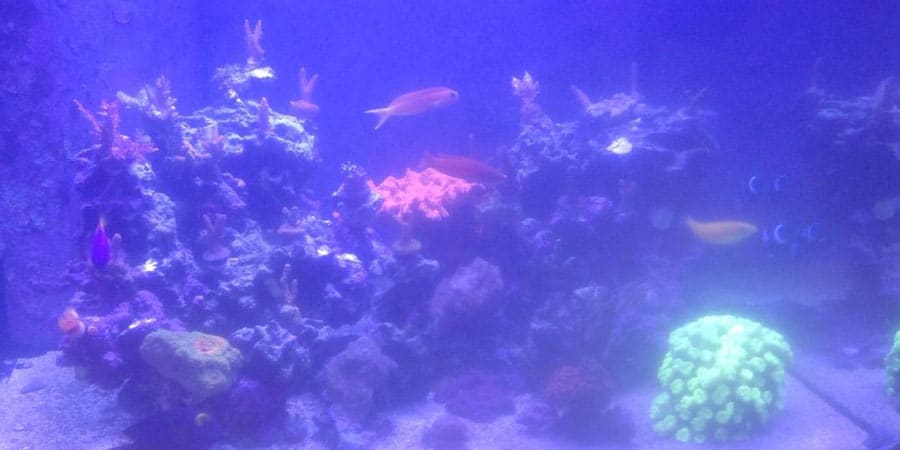
How Do You Prevent Aquarium Water Poisoning?
If you want to use airborne fragrances/cleaners try and research the ones other aquarists use with no side effects. Try to use products with natural ingredients where possible.
Try and keep the fragrance products to another room, keep the door closed to the room housing the aquarium.
Replace cleaning aerosols with creams and pastes and ensure the room is well ventilated after use – Just be sure to watch for temperature fluctuations if the outside ambient temperature is very different from indoors.
Using high quality activated carbon that is changed regularly. This will keep any toxins that enter the water to a minimum concentration before being bound up in the carbon.
The new Roller Mats or Roller Mats can remove any solid parts of a chemical pollutant from the water by rolling the floss to a clean section. Filter socks and filter floss capture the pollutant, but it stays in the water until you change it.
If you want more information on Roller Mats / Fleece Filters you can view them
HERE at Amazon.com
Ensure you are running a good, high-quality protein skimmer that is cleaned and tuned regularly. The protein skimmer and activated carbon are your two best lines of defense in quickly removing any contaminants from your aquarium water.
If you are unsure about the effect of a new candle, oil or air freshener, do not use it or do some testing in another room and see how your aquarium reacts. Your protein skimmer is always a good indicator if there is something in the air that could be toxic! If it goes nuts, it’s telling you!
Further Reading
These other articles may help you on your journey:

